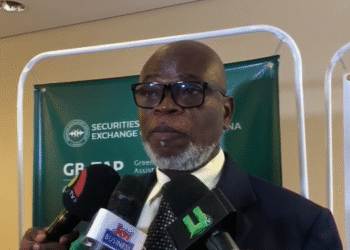The Ghana Stock Exchange (GSE) closed Tuesday’s trading with a mixed performance, as the benchmark Composite Index posted gains while the Financial Stocks Index slid slightly.
CalBank emerged as the most actively traded equity of the day but also bore the heaviest loss among listed companies.
In total, 20 GSE-listed equities participated in the day’s trading session, ending with two gainers, two losers, and the rest remaining flat. The day’s top gainers were NewGold ETF, which advanced by 2.29%, and MTN Ghana, which appreciated by 1.12%. On the losing side, CalBank dropped 3.7%, while Ecobank Transnational Incorporated (ETI) slipped 1.22%.
Despite the decline in a few key financial stocks, the GSE Composite Index (GSE-CI) gained 34.77 points, or 0.5%, to close at 7,040.46 points. This marks a strong 1-week gain of 5.55%, a 4-week gain of 9.71%, and an impressive year-to-date growth of 44.02%.
However, the GSE Financial Stocks Index (GSE-FSI) went in the opposite direction, falling by 0.32% to close at 3,417.48 points. This represents a 1-week loss of 0.19%, a 4-week loss of 0.47%, although the year-to-date figure still reflects a robust 43.54% increase.
CalBank was the most traded stock on the day, recording 688,147 shares exchanged. Despite leading in trading activity, the bank’s share price dropped 3.7%, reflecting investor sell-offs that outweighed demand.
Following closely, MTN Ghana traded 656,892 shares, benefitting from modest gains on the day. SIC Insurance Company saw 143,362 shares change hands, while Ecobank Transnational Incorporated recorded 56,136 shares in trades.
The heavy sell-off in CalBank shares appears to have weighed on the GSE-FSI, as the index is heavily influenced by banking sector performance.
Turnover and Market Capitalization
At the close of trading, the GSE reported a total of 1,574,138 shares traded, corresponding to a market value of approximately GHS 12.62 million. This represented a significant slowdown compared to the previous session on Monday, August 4, with a 71% decline in trading volume and a 34% drop in turnover.
Despite the lower activity, overall market sentiment remained positive, with total market capitalization standing at an impressive GHS 146.6 billion.
NewGold ETF and MTN Ghana Drive Composite Gains
The gains in the GSE Composite Index were largely driven by the performance of NewGold ETF and MTN Ghana. The NewGold ETF, which tracks the price of gold, surged 2.29%, likely benefiting from investor interest in safe-haven assets amid global market uncertainties.
MTN Ghana, one of the exchange’s largest market-cap stocks, rose 1.12% on strong investor demand. The telecom giant continues to be a key driver of the GSE’s upward momentum, given its weight in the Composite Index.
Financial Stocks Under Pressure
While the broader market posted gains, financial stocks showed signs of strain. The decline in CalBank and ETI dragged the GSE-FSI lower, ending a recent positive streak for the index. Analysts suggest that investor caution in the banking sector could be linked to ongoing concerns about loan portfolio quality, interest rate adjustments, and regulatory pressures.
The divergence between the GSE-CI and GSE-FSI performance highlights how non-financial equities, particularly in telecommunications and commodities, are currently leading the market’s upward trajectory.
Market analysts remain cautiously optimistic about the GSE’s short-term outlook. The Composite Index’s strong year-to-date gain of over 44% reflects sustained investor confidence, bolstered by earnings season momentum and positive macroeconomic indicators.
However, the recent pullback in trading volumes suggests that some investors are taking a wait-and-see approach, especially in the financial sector. CalBank’s steep loss, despite high trading activity, underscores the volatility that can emerge when large volumes meet concentrated sell pressure.
Tuesday’s mixed session on the Ghana Stock Exchange reflects the current dual narrative in the market: while growth-oriented and defensive stocks such as MTN Ghana and NewGold ETF continue to push the Composite Index higher, financial stocks face headwinds that are tempering gains in the sector-specific index.























